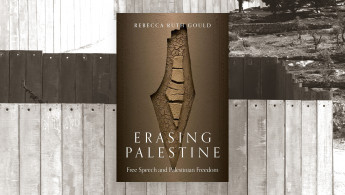Erasing Palestine: How IHRA weaponization puts Palestinian freedom and free speech in a chokehold
The International Holocaust Remembrance Alliance’s (IHRA) Definition of antisemitism is a strategic means of employing the Zionist tactic of Palestinian erasure.
Rebecca Ruth Gould’s recent book, Erasing Palestine: Free Speech and Palestinian Freedom, draws upon theoretical writings, the Palestinian experience, as well as the author’s own experience of observing Palestinian erasure while living in Bethlehem in the occupied West Bank.
Gould’s positioning in the introduction exhibits awareness of complicity – her salary during her brief stint at the Van Leer Institute was funded by Israel. “In accepting the fellowship, I was in violation of the boycott of Israeli academic institutions in which many of my friends and colleagues were involved.”
Observing the erasure of Palestinians in everyday life prompted Gould to write an article titled ‘Beyond Antisemitism’ which was published in Counterpunch, and led to accusations of antisemitism when the author took up a position at the University of Bristol.
"The physical erasure of Palestine coincides with its erasure through language; once Palestinian identity has been successfully suppressed, it becomes that much easier to erase Palestinian claims on Israeli-occupied land"
Departing from her experience, Gould delves into the normalised acceptance of the IHRA definition of antisemitism which includes criticism of Israel, and appeals to a bigger agenda aiding in shaping policy and public opinion.
Various institutions have played a role in shaping the definition of antisemitism – notably the European Monitoring Centre on racism and xenophobia (EUMC), which drafted the initial text proposed to the IHRA in 2015. Gould notes that for an organisation prioritising Holocaust memory, there is dissonance in focusing “on criminalising anti-Israel speech”.
The UK was the first country to adopt the IHRA definition, and it was under this guise that many cancellations of pro-Palestine events started happening in the UK in 2017.
— Palestine Deep Dive (@PDeepdive) June 21, 2023 |
Within the context of her experience, Gould notes that “Palestinian voices and perspectives were neatly elided by rhetorical erasure”.
This observation is rendered visible throughout the book and particularly in the first chapter, where the author argues that Palestinian erasure happens in three ways: the renaming of Palestinian places and Palestinians as Arabs, the fragmentation of space such as the Apartheid Wall, and the censorship of Palestinian voices. “The physical erasure of Palestine coincides with its erasure through language; once Palestinian identity has been successfully suppressed, it becomes that much easier to erase Palestinian claims on Israeli-occupied land.” Language, therefore, must be the medium through which resistance takes place.
Politically, Gould notes that politics solidifies the IHRA definition through erasure of Palestinians, giving the example of the US unilateral decision to move its embassy from Tel Aviv to Jerusalem, as well as Hungary and Romania’s adoption of the IHRA definition, despite their antisemitic policies and suppression of ethnic cleansing collective memory.
Inside Israel, checkpoints erase time for Palestinians resulting in schedule disruptions, apart from humiliation. Signs at checkpoints complement the settler-colonial erasure of the indigenous Palestinians.
Gould’s book discusses anti-Zionism prior to the establishment of the Jewish settler-colonial state, citing Jewish opposition in London to the Jewish state, as well as UK Secretary of State for India Edwin Montagu’s opposition to the Balfour Declaration – the latter sharing similarities with the IHRA definition of antisemitism through its erasure of Palestinians.
“In the case of the first document, the rights of an entire people, the Palestinians, were erased in order to accommodate Britain’s wartime strategy. In the case of the second document, the accusation of antisemitism was used as a weapon to conceal more than a century of imperial complicity,” the author notes.
The book also gives an account of the socioeconomic approach to antisemitism from the writings of Leon Trotsky and Abram Leon. Their critiques of Zionism, Gould notes, were developed during the Nazi genocide of the Jewish people.
Leon, the author writes, wove discussions of how capitalism necessitates racism and how British imperialism was instrumental for Zionist settlers seeking to establish colonies in Palestine, also noting that imperialism harmed Jewish interests in the long term.
"Gould’s book exposes how politics and language have created an ever-shrinking space which, while encouraging impunity for Israel and its violence, has also limited Palestinian identity and free speech"
The IHRA definition’s role in silencing academics is discussed towards the end of the book, with the author noting how individuals become “targets of proxy conflicts” as a result of pressure groups and lobbies.
Gould discusses the case of British lecturer David Miller who was fired from his position at the University of Bristol for comments made away from campus.
In the UK, Gould asserts, free speech has a weak legal freedom that “becomes more fragile with every violation of academic freedom”. In terms of Palestine, it is important to retain freedom of expression in ways that serve the Palestinian cause of liberation.
Gould gives ample historical context in her book, setting the IHRA definition of antisemitism against a backdrop of political decisions and policies which have normalised the definition and its adoption.
Language, as the author asserts in the beginning, is an important medium to combat the erasure of Palestinians and their narratives. Gould’s book exposes how politics and language have created an ever-shrinking space which, while encouraging impunity for Israel and its violence, has also limited Palestinian identity and free speech.
Ramona Wadi is an independent researcher, freelance journalist, book reviewer and blogger specialising in the struggle for memory in Chile and Palestine, colonial violence and the manipulation of international law.
Follow her on Twitter: @walzerscent


![President Pezeshkian has denounced Israel's attacks on Lebanon [Getty]](/sites/default/files/styles/image_684x385/public/2173482924.jpeg?h=a5f2f23a&itok=q3evVtko)



 Follow the Middle East's top stories in English at The New Arab on Google News
Follow the Middle East's top stories in English at The New Arab on Google News


